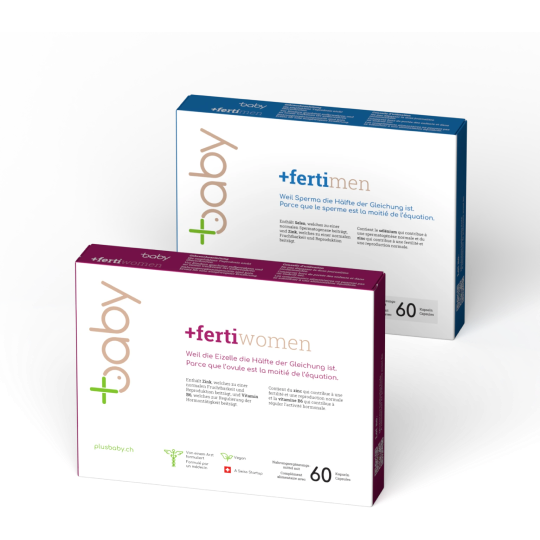Omega 3 and fertility: Omega-3 fatty acids are crucial components of a healthy diet, recognised for their many benefits to general health. These polyunsaturated fatty acids are essential, which means that the human body cannot synthesise them and must obtain them from the diet. Of the different types of omega-3, EPA (eicosapentaenoic acid) and DHA (docosahexaenoic acid) are particularly important, mainly found in oily fish and certain seaweed.
Omega-3s play a vital role in maintaining cardiovascular health, helping to regulate cholesterol and triglycerides in the blood, and have significant anti-inflammatory properties. Beyond these well-established benefits, emerging research suggests a link between omega-3s and fertility. In women, they may influence egg quality and regulate reproductive hormones, while in men they may improve sperm quality by affecting sperm motility and concentration.
In addition, DHA in particular is crucial for the neurological and visual development of the foetus during pregnancy. Adequate consumption of omega-3s, particularly from vegan sources such as seaweed, is therefore recommended not only for those seeking to improve their general health, but also for men and women of childbearing age, highlighting their potential importance in the run-up to conception and during pregnancy.Les acides gras oméga-3 et leurs rôles
Les acides gras sont des composants fondamentaux des lipides, essentiels au bon fonctionnement de notre organisme. Ils se classent en trois grandes catégories : saturés, insaturés et polyinsaturés, en fonction de leur structure chimique et de la présence de doubles liaisons entre les atomes de carbone :
Saturated fatty acids
Saturated fatty acids contain no double bonds between carbon atoms, making them solid at room temperature. They are found mainly in animal products such as red meat, butter and cheese, and in certain vegetable oils such as palm oil. Excessive consumption may be linked to an increased risk of cardiovascular disease.
Omega 3 and fertility: Unsaturated fatty acids
These contain one (monounsaturated) or more (polyunsaturated) double bonds in their carbon chain, making them liquid at room temperature. Vegetable oils, nuts, seeds and fish are good sources of unsaturated fatty acids. They are generally considered to be beneficial to health, particularly the heart.
Polyunsaturated fatty acids
This category includes the famous omega-3s and omega-6s, which are essential for good health because the body cannot produce them. They must therefore be provided in the diet.
Focus on omega-3 – Omega 3 and fertility
Omega-3 is a type of polyunsaturated fatty acid that is crucial for many bodily functions. The three main types of omega-3 are :
ALA (alpha-linolenic acid)
Mainly found in plants such as linseed, rapeseed oil, walnuts and green leafy vegetables. This is the most common form of omega-3 in vegetarian diets.
EPA (eicosapentaenoic acid)
EPA is a long-chain fatty acid that plays a key role in anti-inflammatory processes and cardiovascular health. It works by producing eicosanoids, which have anti-inflammatory effects and can help reduce the symptoms of inflammatory conditions such as rheumatoid arthritis. EPA also contributes to mental health, helping to combat depression. In terms of cardiovascular health, EPA helps keep artery walls supple and prevents plaque build-up, reducing the risk of heart attacks and strokes.
DHA (docosahexaenoic acid)
DHA is a major structural component of brain and retinal tissue, accounting for around 97% of omega-3s in the brain and up to 93% of omega-3s in the retina. It is therefore crucial for the development and maintenance of brain and visual functions.
DHA is essential from the earliest stages of foetal development, contributing to the development of the nervous system and vision. Studies have shown that children of mothers who have consumed sufficient DHA during pregnancy and breastfeeding can benefit in terms of cognitive and visual development. In adults, DHA helps maintain the fluidity of cell membranes, which is vital for the efficient transmission of neuronal signals. DHA deficiency has been associated with an increased risk of neurodegenerative diseases such as Alzheimer’s. DHA also supports mental health, helping to manage mood and prevent depression. Although EPA is more directly linked to cardiovascular health, DHA also helps to reduce triglycerides and regulate blood pressure. It can help prevent thrombosis by reducing platelet aggregation.
DHA may also have anti-inflammatory effects, although its mechanisms are less direct than those of EPA. It is involved in the production of resolvins and protectins, molecules that help to resolve inflammation and protect neuronal tissue.
Roles in the body and impact on health
Omega-3s play a number of essential roles in the body:
Brain and eye development
DHA is a major component of the cell membranes of the brain and retina, essential for neurological and visual development.
Cardiovascular health
Omega-3s help to reduce blood triglyceride levels, lower the risk of blood clots and may slightly lower blood pressure. They also help prevent cardiac arrhythmias, thereby reducing the risk of heart attacks.
Anti-inflammatory properties
Omega-3s can reduce the production of inflammatory substances in the body, playing a role in the fight against chronic inflammation that can lead to cardiovascular disease, diabetes, arthritis and other pathologies.
The link between omega-3, cardiovascular health and the regulation of inflammatory processes is therefore well established. Adequate consumption of omega-3s, through a balanced diet or food supplements, is essential for maintaining these crucial aspects of our health.
Omega-3 and fertility
Research into the impact of omega-3 fatty acids on fertility is a growing area of interest due to their proven beneficial effects on many aspects of human health. These polyunsaturated fatty acids play a crucial role not only in cardiovascular health and the regulation of inflammatory processes, but also in hormonal and reproductive health.
Effect of omega-3 on male fertility
In men, sperm quality is a key indicator of fertility. Research suggests that omega-3 fatty acids, particularly DHA, are vital for sperm health. DHA is a major component of the sperm membrane, and adequate levels are associated with improved membrane fluidity and flexibility, which is essential for sperm functionality, including motility and the ability to fertilise an egg. Studies have shown that men with a higher intake of omega-3 may have improved sperm concentration, motility and morphology, which could improve fertility rates.
Effect of omega-3 on female fertility
On the female side, omega-3s also play a role in fertility, notably by influencing menstrual cycles and improving egg health. The balance of essential fatty acids in the body can affect hormone levels, including those involved in reproduction, such as oestrogen and progesterone. Omega-3s can help regulate these hormone levels, contributing to a more favourable environment for conception. What’s more, DHA is also crucial to the health and quality of eggs, as it contributes to the fluidity of cell membranes, promoting a better environment for fertilisation and early embryonic development.
The role of fatty acids in hormonal and reproductive health
Omega-3 fatty acids may also have beneficial effects on conditions such as polycystic ovary syndrome (PCOS) and endometriosis, which are frequent causes of fertility problems in women. By modulating inflammatory processes and influencing hormone metabolism, omega-3s may help to alleviate some of the symptoms associated with these conditions, potentially improving fertility.
Importance for cell membranes
The structure and function of cell membranes are essential for fertility in both men and women. Omega-3 fatty acids, particularly DHA, contribute to the fluidity and flexibility of cell membranes, which is crucial for the proper functioning of sperm and egg cells. A healthy cell membrane is vital for cell signalling processes, sperm and egg fusion and early embryonic development.
In summary, omega-3s play a multidimensional role in fertility, positively affecting sperm quality, egg health, hormonal balance and cell membrane function. Although further research is needed to fully understand these effects, current evidence suggests that maintaining an adequate intake of omega-3 may be beneficial for those seeking to improve their fertility.
Plusbaby +omega 3 DHA Vegan
An in-depth understanding of the significant link between omega-3 fatty acids and fertility is precisely why Plusbaby has developed its innovative product, +omega 3 DHA Vegan. Recognising the vital importance of DHA to both male and female reproductive health, Plusbaby has designed this supplement to provide a pure, vegan source of omega-3. By focusing specifically on algae-derived DHA, +omega 3 DHA Vegan offers a sustainable and ethical alternative to traditional sources of omega-3, without compromising efficacy. This formulation meets the needs of individuals seeking to optimise their fertility and overall reproductive health, while aligning their supplementation choices with vegan and environmentally-friendly values. Plusbaby is committed to supporting couples in their desire to conceive, by providing essential nutrients that play a key role in achieving a healthy pregnancy.
Nutrition and fertility
Diet plays a central role in reproductive health, and balanced nutrition is essential for optimising fertility in both men and women. The quality of our diet affects not only our general health, but also our ability to conceive and maintain a healthy pregnancy.
Key nutrients and their source
Omega-3 fatty acids, in particular, are crucial for fertility. They improve sperm quality in men and contribute to hormonal health and foetal development in women. Sources include oily fish such as salmon, flaxseed, walnuts and supplements such as Plusbaby +omega 3 DHA Vegan.
Vitamin D is associated with better fertility outcomes and embryonic development. Sources include sun exposure, fortified foods and supplements.
B vitamins, particularly folic acid (B9), are essential for reducing the risk of neural tube defects in the foetus and improving fertility outcomes. Sources include green leafy vegetables, legumes and whole grains.
Zinc is vital for hormone regulation and sperm quality. It is found in meat, seafood, nuts and seeds. Selenium helps prevent oxidative damage and improves fertility. Sources include fish, eggs and Brazil.
Antioxidants such as vitamin C, vitamin E and beta-carotene help protect cells, including gametes, from oxidative damage. Colourful fruit and vegetables, nuts and seeds are excellent sources of antioxidants.
Role in reproductive health
The key nutrients mentioned play various roles in reproductive health:
Essential fatty acids influence the fluidity of egg and sperm cell membranes, facilitating fertilisation. Vitamins and minerals regulate reproductive hormones, support cell division and reduce inflammation, thus contributing to a healthy reproductive environment. Antioxidants protect reproductive cells from free radical damage, improving egg and sperm quality.
Impact of nutritional deficiencies on fertility
Nutritional deficiencies can have a significant impact on fertility. For example, folic acid deficiency can increase the risk of neural tube defects, while zinc deficiency can reduce sperm quality. Similarly, a low intake of antioxidants can lead to increased oxidative stress, damaging reproductive cells and reducing fertility.
For couples seeking to conceive, it is crucial to adopt a diet rich in nutrients essential for fertility. In addition to a balanced diet, specific supplements such as Plusbaby’s +omega 3 DHA Vegan and the +fertimen and +fertiwomen range of multivitamins for boosting female and male fertility can be beneficial in filling nutritional gaps and supporting optimal reproductive health.
Advice on incorporating omega-3 fatty acids into your diet
Incorporating omega-3 fatty acids into your daily diet is a crucial step towards improving your general health and fertility. Here are some practical tips for increasing your omega-3 intake:
Foods rich in omega-3
Salmon, mackerel, sardines and herring are excellent sources of EPA and DHA. Include oily fish in your diet at least twice a week. Chia seeds, flax seeds and walnuts, particularly walnuts, are rich in ALA, a plant-based form of omega-3. Add them to your smoothies and salads, or eat them as a snack. Flaxseed oil and chia oil are excellent plant sources of ALA. Use these oils in vinaigrettes or add them to cold dishes.
Cooking and storage advice
Favour gentle cooking methods such as steaming, baking or pan-frying over a low heat to preserve the omega-3s in fish and prevent the fatty acids from breaking down.
Store omega-3-rich oils and nuts in a cool, dark place to avoid oxidation. Ground linseed can be kept in the fridge to prolong its freshness.
Menu suggestions and recipes
Breakfast: A spinach smoothie with chia seeds, walnuts and a drizzle of linseed oil. Or a bowl of yoghurt with chopped walnuts and ground flax seeds.
Lunch: A grilled salmon salad with avocado (another source of healthy fatty acids) and flaxseed oil dressing.
Dinner: Baked mackerel fillets with roasted mixed vegetables drizzled with chia oil.
Food supplements
For those who may find it difficult to get enough omega-3 in their diet from food alone, or for vegetarians and vegans, food supplements such as Plusbaby +omega 3 DHA Vegan offer a practical alternative. This supplement is specially designed to provide a concentrated source of plant-derived omega-3 DHA, derived from algae, without the concerns associated with marine pollutants.
Conclusion: Omega 3 and fertility
Omega 3 and fertility: Growing awareness of the importance of omega-3 fatty acids in the diet highlights their crucial role not only in maintaining good general health but also in promoting optimal fertility. Omega-3s, particularly DHA, play essential roles in reproductive health, positively affecting sperm quality in men and contributing to a healthy hormonal and cellular environment in women. Incorporating omega-3-rich foods into your daily diet, along with careful attention to cooking and preservation methods, can significantly improve your intake of these essential nutrients.
For those who find it challenging to obtain sufficient omega-3s from their diet alone, or for individuals following vegetarian or vegan diets, food supplements such as Plusbaby +omega 3 DHA Vegan offer an effective and suitable solution. This product, specifically designed to meet the needs of people seeking to improve their fertility, embodies the intersection of targeted nutrition and reproductive health.
In conclusion, taking a proactive approach to nutrition, with an emphasis on omega-3 fatty acids, is a key strategy for those aspiring to improve their fertility. Plusbaby’s commitment to providing high quality nutritional solutions underlines the importance of supporting reproductive health through informed dietary and supplementation choices.







